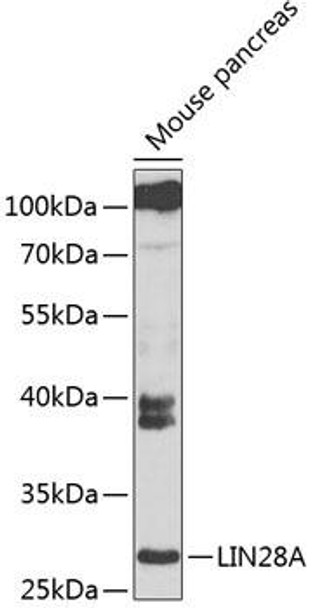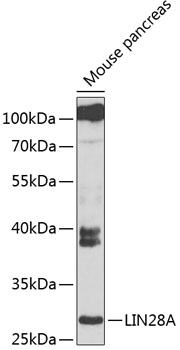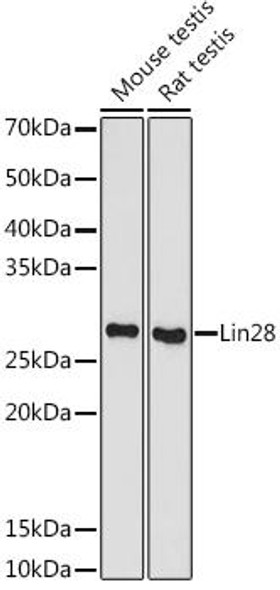Epigenetics & Nuclear Signaling Antibodies 2
Anti-LIN28 Antibody (CAB6034)
- SKU:
- CAB6034
- Product Type:
- Antibody
- Reactivity:
- Human
- Reactivity:
- Mouse
- Host Species:
- Rabbit
- Isotype:
- IgG
- Antibody Type:
- Polyclonal Antibody
- Research Area:
- Epigenetics and Nuclear Signaling
Description
| Antibody Name: | Anti-LIN28 Antibody |
| Antibody SKU: | CAB6034 |
| Antibody Size: | 20uL, 50uL, 100uL |
| Application: | WB IF |
| Reactivity: | Human, Mouse |
| Host Species: | Rabbit |
| Immunogen: | Recombinant fusion protein containing a sequence corresponding to amino acids 142-209 of human LIN28 (NP_078950.1). |
| Application: | WB IF |
| Recommended Dilution: | WB 1:500 - 1:1000 IF 1:50 - 1:100 |
| Reactivity: | Human, Mouse |
| Positive Samples: | Mouse pancreas |
| Immunogen: | Recombinant fusion protein containing a sequence corresponding to amino acids 142-209 of human LIN28 (NP_078950.1). |
| Purification Method: | Affinity purification |
| Storage Buffer: | Store at -20'C. Avoid freeze / thaw cycles. Buffer: PBS with 0.02% sodium azide, 50% glycerol, pH7.3. |
| Isotype: | IgG |
| Sequence: | CGGL DHHA KECK LPPQ PKKC HFCQ SISH MVAS CPLK AQQG PSAQ GKPT YFRE EEEE IHSP TLLP EAQN |
| Gene ID: | 79727 |
| Uniprot: | Q9H9Z2 |
| Cellular Location: | Cytoplasm, Nucleus, nucleolus |
| Calculated MW: | 22kDa |
| Observed MW: | 28kDa |
| Synonyms: | LIN28A, CSDD1, LIN-28, LIN28, ZCCHC1, lin-28A |
| Background: | This gene encodes a LIN-28 family RNA-binding protein that acts as a posttranscriptional regulator of genes involved in developmental timing and self-renewal in embryonic stem cells. The encoded protein functions through direct interaction with target mRNAs and by disrupting the maturation of certain miRNAs involved in embryonic development. This protein prevents the terminal processing of the LET7 family of microRNAs which are major regulators of cellular growth and differentiation. Aberrant expression of this gene is associated with cancer progression in multiple tissues. |
| UniProt Protein Function: | LIN28A: Acts as a 'translational enhancer', driving specific mRNAs to polysomes and thus increasing the efficiency of protein synthesis. Its association with the translational machinery and target mRNAs results in an increased number of initiation events per molecule of mRNA and, indirectly, in stabilizing the mRNAs. Binds IGF2 mRNA, MYOD1 mRNA, ARBP/36B4 ribosomal protein mRNA and its own mRNA. Essential for skeletal muscle differentiation program through the translational up-regulation of IGF2 expression. Acts as a suppressor of microRNA (miRNA) biogenesis by specifically binding the precursor let-7 (pre-let- 7), a miRNA precursor. Acts by binding pre-let-7 and recruiting ZCCHC11/TUT4 uridylyltransferase, leading to the terminal uridylation of pre-let-7. Uridylated pre-let-7 miRNAs fail to be processed by Dicer and undergo degradation. Degradation of pre- let-7 in embryonic stem (ES) cells contributes to the maintenance of ES cells. In contrast, LIN28A down-regulation in neural stem cells by miR-125, allows the processing of pre-let-7. Specifically recognizes the 5'-GGAG-3' motif in the terminal loop of pre-let-7. Also recognizes and binds non pre-let-7 pre-miRNAs that contain the 5'-GGAG-3' motif in the terminal loop, leading to their terminal uridylation and subsequent degradation. Monomer. During skeletal muscle differentiation, associated with translation initiation complexes in the polysomal compartment. Directly interacts with EIF3S2. Interaction with NCL is RNA-dependent. Interacts with ZCCHC11/TUT4. Can be negatively regulated by the interaction of microRNAs miR-125a and miR-125b with at least two miRNA responsive elements (miREs) in the 3'-UTR of this gene. These interactions may reduce both translation efficiency and mRNA abundance. Negatively regulated by retinoic acid. Expressed in embryonic stem cells (ES cells), placenta and testis. Belongs to the lin-28 family. |
| UniProt Protein Details: | Protein type:Nucleolus; RNA-binding; Translation Chromosomal Location of Human Ortholog: 1p36.11 Cellular Component: cytoplasm; cytosol; nucleus; stress granule Molecular Function:protein binding; RNA binding Biological Process: pre-microRNA processing; RNA 3'-end processing; somatic stem cell maintenance; stem cell maintenance |
| NCBI Summary: | This gene encodes a LIN-28 family RNA-binding protein that acts as a posttranscriptional regulator of genes involved in developmental timing and self-renewal in embryonic stem cells. The encoded protein functions through direct interaction with target mRNAs and by disrupting the maturation of certain miRNAs involved in embryonic development. This protein prevents the terminal processing of the LET7 family of microRNAs which are major regulators of cellular growth and differentiation. Aberrant expression of this gene is associated with cancer progression in multiple tissues. [provided by RefSeq, Sep 2015] |
| UniProt Code: | Q9H9Z2 |
| NCBI GenInfo Identifier: | 74752750 |
| NCBI Gene ID: | 79727 |
| NCBI Accession: | Q9H9Z2.1 |
| UniProt Related Accession: | Q9H9Z2 |
| Molecular Weight: | 22,743 Da |
| NCBI Full Name: | Protein lin-28 homolog A |
| NCBI Synonym Full Names: | lin-28 homolog A |
| NCBI Official Symbol: | LIN28A |
| NCBI Official Synonym Symbols: | CSDD1; LIN28; LIN-28; ZCCHC1; lin-28A |
| NCBI Protein Information: | protein lin-28 homolog A |
| UniProt Protein Name: | Protein lin-28 homolog A |
| UniProt Synonym Protein Names: | Zinc finger CCHC domain-containing protein 1 |
| Protein Family: | Protein |
| UniProt Gene Name: | LIN28A |
| UniProt Entry Name: | LN28A_HUMAN |
View AllClose







